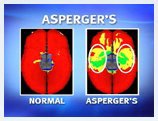Two weeks back, just after the Dr. Phil show on Asperger's and Tourette Syndromes, Sweet M was scheduled for a check-up with her psychiatrist. While we were there, I mentioned the Dr. Phil show, with the brain imaging slides. I guess I was wondering if we ought to be thinking about some brain scans for Sweet M.
Dr. B's response surprised me, and I'm guessing that it would also surprise Dr. Phil's viewers, so I'm going to share it with you.
When I mentioned that the Dr. Phil show had announced itself as offering new treatment options when all the show seemed to offer were new diagnostic tools in the form of brain scans, Dr. B interrupted.
"But they're not even that," Dr. B said, "They're not that new, and they're not even good diagnostic tools because we just don't have enough data yet to be able to use them diagnostically. What these places [he named two brain scan centers] are doing," he said, "is charging people $7000-9000 for pictures of their brains or their kids' brains, for images that don't really tell you much of anything."
Dr. B works at very prestigious medical research institute himself, so I'm inclined to trust his opinion about such matters.
An article in Sunday's New York Times (2/5/06) suggests nearly the same degree of skepticism about brain scans—not at the level of individual diagnosis, but at the level of contributing to our overall knowledge of brain function:
All of this suggests to me that the Dr. Phil segment on Asperger's was more of an hour-long infomercial for brain scan providers than a show exploring the challenges that families with Asperger's face."Any new method in neuroscience is powerful in terms of evolution of the field only insofar as it tells us that something we thought we knew is wrong," said Dr. J. Anthony Movshon, director of New York University's Center for Neural Science. So far, he said, brain imaging has not done that.
The technology, he said, though now central to brain science, "is in one sense disappointing, in that so far it has told us nothing more than what a neurologist of the 19th century could have told you about brain functions and where they're localized."
And that may be where the hazard lies. The brain's increasingly popular image is a fascinating prop, a colorful as well as useful map, but so far it provides only the illusion of depth (emphasis added).
And given the high-costs associated with raising kids in the spectrum, the last thing we autism parents need is another costly test that has dubious diagnostic value.
Keywords: autism • Asperger's Syndrome • parenting • Dr. Phil • brain scans

3 comments:
Liz here from I Speak of Dreams. Good post.
There are brainscans and brainscans.
I just want to take a second to differentiate the functional MRI (fMRI) from a static image. The fMRI has been used to good effect in elucidating the difference between brain use by good readers, and brain use by dyslexics, and to prove that effective teaching methods literally change brain useage.
To the best of my knowledge, no one is (yet) flogging fMRI's as a diagnostic tool in dyslexia. There are easier and cheaper ways.
I think the Courchesne lab in San Diego is also doing brain scansof autistic individuals with fMRI. We did an MRI a few years ago for Charlie---with all the head stuff going on.......----our neurologist made the tautological conclusion that Charlie's brain is abnormal in the ways that autistic individuals' brains are abnormal. I also noted that article in the Sunday Times and glad you posted on it!
Thanks so much.. for the lookout.. And I'm glad I don't watch Dr. Phil or Oprah. Stopped watching Oprah since '92. lol.. Besides, It's always about money. The Biggest Scam In History
Post a Comment